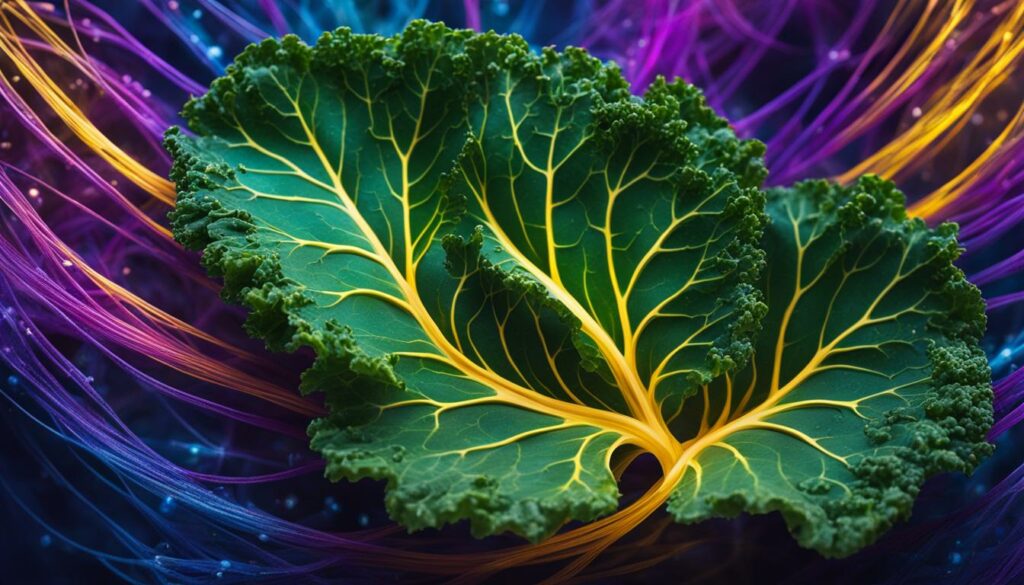When it comes to superfoods, kale undoubtedly takes center stage. Packed with a plethora of essential vitamins, minerals, and antioxidants, kale is a true nutritional powerhouse. Not only does it contribute to a well-rounded diet, but it also offers an array of health benefits that support weight management, digestion, and overall well-being.
What sets kale apart is its exceptional nutritional value. This leafy green vegetable is a rich source of vitamins A, B6, C, and K, as well as folate, fiber, carotenoids, and manganese. Its low carbohydrate content and high fiber content make it an ideal choice for those looking to shed some pounds or enhance digestion.
Key Takeaways:
- Kale is a nutrient-dense vegetable packed with vitamins and minerals.
- It supports weight management and digestive health due to its low carb and high fiber content.
- Kale’s rich nutritional profile includes vitamins A, B6, C, and K, as well as folate, fiber, carotenoids, and manganese.
- Incorporating kale into your diet is a simple way to reap its many health benefits.
- Whether in salads, smoothies, or stir-fries, kale is a versatile addition to any meal plan.
The Nutritional Powerhouse: Kale’s Benefits Unveiled
Kale is renowned for its impressive nutritional profile. It is packed with essential vitamins, minerals, and other beneficial compounds that contribute to overall health and well-being.
Vitamins in Kale
Kale is particularly rich in vitamins, including:
- Vitamin K: Essential for blood clotting and bone health.
- Vitamin A: Supports vision, immune function, and skin health.
- Vitamin C: Aids in collagen production, wound healing, and immune system boosting.
Minerals in Kale
Kale is abundant in minerals that are crucial for various bodily functions:
| Minerals | Benefits |
|---|---|
| Calcium | Supports bone strength and density. |
| Magnesium | Essential for muscle and nerve function. |
| Potassium | Regulates blood pressure and helps maintain heart health. |
Benefits of Kale for Weight Loss
The high fiber content in kale promotes satiety, helping you feel full for longer periods. Additionally, kale is low in calories and carbohydrates, making it an excellent choice for weight management.
“Kale’s high fiber content aids in weight loss by promoting feelings of fullness and reducing calorie intake.”
Benefits of Kale for Digestion
The fiber in kale supports a healthy digestive system by promoting regular bowel movements and preventing constipation. It also helps manage blood sugar levels, promoting stable energy levels throughout the day.
Benefits of Kale for Bone Health
Kale’s rich calcium content supports strong bones and may help prevent conditions like osteoporosis. Its vitamin K content also plays a crucial role in bone health by aiding in calcium absorption.
To reap the maximum benefits of kale, incorporate it into your meals and enjoy its nutritional goodness.
Kale’s Health-Boosting Properties
Kale’s impressive nutritional profile translates into numerous health benefits. Its high fiber content and low calorie count make it an ideal food for weight management.
The antioxidants and nutrients in kale contribute to heart health by reducing cholesterol and blood pressure levels. Kale’s cancer-protective properties, including compounds like sulforaphane and indole-3-carbinol, are being studied for their potential efficacy in managing certain types of cancer.
The rich array of vitamins and minerals in kale supports bone strengthening and reduces the risk of fractures. Lastly, kale’s high vitamin C content helps bolster the immune system and aids in cell repair, preventing oxidative stress.
Weight Management
Kale’s high fiber content and low calorie count make it a valuable asset for weight management. The fiber in kale helps promote feelings of fullness, reducing the likelihood of overeating.
By incorporating kale into your meals, you can increase your satiety while keeping your calorie intake in check. This nutrient-packed vegetable provides the necessary nutrients to support your overall health, without compromising your weight management goals.
Heart Health
The antioxidants present in kale, such as flavonoids and carotenoids, contribute to heart health by reducing oxidative stress and inflammation. These compounds help protect the cardiovascular system by preventing the buildup of plaque in the arteries and lowering blood pressure levels.
Incorporating kale into your diet can provide the nutrients necessary for a healthy heart and reduce the risk of heart disease.
Cancer Risk Reduction
Kale contains unique compounds, including sulforaphane and indole-3-carbinol, which have been shown to have cancer-protective properties. These compounds have the potential to inhibit the growth of cancer cells and promote their destruction.
While more research is needed, including kale in your diet may contribute to reducing the risk of certain types of cancer.
Bone Strengthening
The rich array of vitamins and minerals found in kale, including calcium, magnesium, and vitamin K, support bone health and aid in bone strengthening. Adequate intake of these nutrients is crucial for maintaining strong and healthy bones, reducing the risk of fractures and osteoporosis.
Including kale in your diet can provide the necessary nutrients to support bone maintenance and overall skeletal health.
Immune Support
Kale’s high vitamin C content helps bolster the immune system by supporting cell repair and preventing oxidative stress. Vitamin C plays a vital role in the production of collagen, which is essential for wound healing and maintaining the integrity of skin, tissues, and blood vessels.
By incorporating kale into your meals, you can enhance your body’s ability to fight off infections and maintain a robust immune response.

Include a visually appealing and relevant image of kale in this section, showcasing its vibrant color and freshness. The image reinforces the topic of kale’s health-boosting properties, providing a visual representation of the nutritious vegetable.
Fiber and Antioxidants: Kale’s Role in Digestive Health and Oxidative Stress Reduction
Kale is not only a nutritional powerhouse but also offers remarkable benefits for digestive health and oxidative stress reduction. Its high fiber content plays a crucial role in supporting digestion and managing blood sugar levels.
The abundance of antioxidants in kale, such as beta-carotene and flavonoids, contributes to reducing oxidative stress and inflammation in the body. This, in turn, helps lower the risk of chronic diseases and promotes overall well-being.
Furthermore, kale supports a healthy gut microbiome, which is essential for optimal digestion and nutrient absorption. A balanced and diverse gut microbiota helps maintain digestive health, boosts the immune system, and even influences mental well-being.
Kale’s combination of fiber and antioxidants provides comprehensive support for promoting a healthy digestive system and reducing oxidative stress. By incorporating kale into your diet, you can enjoy these benefits and contribute to your overall health and well-being.

| Kale Benefits | Key Points |
|---|---|
| Fiber in Kale | High fiber content aids digestion and blood sugar management |
| Antioxidants in Kale | Beta-carotene and flavonoids combat oxidative stress and inflammation |
| Digestive Health | Supports a healthy gut microbiome for optimal digestion |
| Oxidative Stress Reduction | Reduces the risk of chronic diseases associated with oxidative stress |
Kale for Skin Health and Weight Management
Kale offers numerous health benefits beyond its nutritional value. Not only is it packed with essential vitamins and minerals, but kale also contributes to skin health and weight management.
When it comes to skin health, kale’s rich concentration of vitamins A and C is particularly beneficial. Vitamin A supports the production of collagen, a protein that helps maintain the elasticity and strength of the skin.
This vitamin also promotes the growth of new skin cells, resulting in a healthier, more vibrant complexion. Meanwhile, vitamin C is known for its wound-healing properties and its ability to boost the immune system, keeping the skin protected and resilient against environmental stressors.
But kale’s benefits extend beyond the skin. If you’re looking to manage your weight, kale can be a valuable addition to your diet. With its low calorie count and high fiber content, kale provides a satisfying and nutritious option for weight loss and weight management.
The fiber in kale promotes feelings of fullness, reducing the likelihood of overeating, while its nutrient density ensures you’re getting essential vitamins and minerals without excess calories.
To illustrate the weight management potential of kale, here’s a breakdown of its nutritional content per 100 grams:
| Nutrient | Amount |
|---|---|
| Calories | 49 |
| Fiber | 4.1 grams |
| Protein | 4.3 grams |
| Fat | 0.9 grams |
| Vitamin A | 9990 IU |
| Vitamin C | 93.4 mg |
With its low calorie count and high nutrient content, kale is an excellent choice for those looking to maintain a healthy weight. Its ability to provide satiety, combined with its anti-inflammatory properties, makes it suitable for inclusion in any weight management plan.
Overall, kale’s benefits extend beyond its contribution to overall health and well-being. Its vitamin-rich composition makes it a valuable asset for promoting skin health and supporting weight management goals. Incorporating kale into your diet can be as simple as adding it to salads, blending it into smoothies, or sautéing it as a side dish.
Conclusion
Kale is a versatile and nutrient-dense vegetable that offers a wide range of health benefits. It is a great source of vitamins, minerals, fiber, and antioxidants, making it an excellent addition to a healthy diet.
Whether you’re looking to support weight management, promote heart health, reduce the risk of cancer, strengthen bones, or boost your immune system, kale can play a significant role.
Incorporating kale into your meals can be as simple as adding it to salads, smoothies, stir-fries, or sautéing it as a side dish. Its mild flavor and sturdy texture make it a versatile ingredient that can enhance the nutritional value of your favorite recipes.
Embrace the nutritional power of kale and enjoy the benefits it offers for your overall health and well-being. Start incorporating kale into your diet today and experience firsthand the positive impact it can have on your health and vitality.
FAQ
What are the health benefits of kale?
Kale offers numerous health benefits, including its impressive nutritional profile, which is rich in vitamins (such as A, B6, C, and K), minerals (like calcium and magnesium), fiber, and antioxidants. It supports weight management, heart health, cancer risk reduction, bone strengthening, and immune support.
What is the nutritional value of kale?
Kale is a nutrient-dense vegetable that provides vitamins A, B6, C, and K, along with folate, fiber, carotenoids, manganese, and other essential minerals. It is low in carbs but high in fiber, making it an ideal choice for weight management and digestive health.
Is kale beneficial for weight loss?
Yes, kale can support weight loss as it is low in calories, high in fiber, and packed with essential nutrients. Its high fiber content promotes satiety, while its low calorie count makes it an excellent option for weight management and a balanced diet.
How does kale benefit digestion?
The high fiber content in kale promotes healthy digestion by supporting regular bowel movements and preventing constipation. It helps maintain a healthy gut microbiome, contributing to overall digestive well-being.
What vitamins and minerals are found in kale?
Kale is rich in a variety of vitamins and minerals, including vitamins A, B6, C, and K, along with calcium, magnesium, and other essential minerals. These nutrients contribute to various aspects of health, such as bone strengthening, immune support, and skin health.
How can I incorporate kale into my diet?
There are many ways to enjoy kale in your diet. You can add it to salads, stir-fries, or smoothies. Another option is to sauté kale as a delicious side dish. Get creative and explore different recipes to find your favorite way of incorporating kale into your meals.




